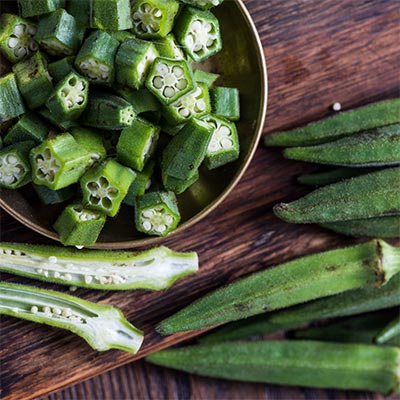The seeds of okra are used as a coffee substitute in some countries.
 Background
Background
- Okra is a member of the Malvaceae botanical family which also consists of cacao (cocoa) and durian fruit.
- Okra is thought to have originated in Africa and thus thrives in hotter climates.
Nutrition
- Okra is an excellent source of vitamin K and vitamin C and a good source of manganese.
- Vitamin K encourages blood clotting and strong bones.
- Vitamin C is an antioxidant that promotes wound healing, immune function, and collagen and connective tissue function.
- Manganese supports wound healing and cartilage and bone formation.
How to Purchase, Prepare, and Store
- Purchase okra at grocers or local food markets.
- Choose fresh okra that is 2-4 inches long and bright green in color without any blemishes.
- Avoid okra that have soft spots, are shriveled or bendy or those that are overly large as these tend to be overripe and tough.
- Larger okra can be used in stews as it contains more gelatinous properties than small ones.
- To prepare okra, rinse with water. Older okra has more fuzz on the outer skin. To remove the fuzz, run under water and rub off with a paper towel. Once rinsed, dry completely.
- Trim off the stem and tip of the okra.
- Store okra unwashed in a sealed container in the refrigerator. Okra is delicate and should be used within 2-3 days of purchase.
- Okra can be fried, roasted, sautéed, or used to thicken stews.
Nutrition Facts
1/2 cup okra, cooked, boiled, drained, without salt
- Calories: 17.6
- Protein: 1.5 g
- Fat: 0.16 g
- Carbohydrate: 3.6 g
- Fiber: 2.0 g
- Calcium: 61.6 mg
- Iron: 0.22 mg
- Magnesium: 28.8 mg
- Phosphorus: 25.6 mg
- Folate: 36.8 μg
- Vitamin A: 11.2 μg
Via fdc.nal.usda.gov
Recipes
Request an Appointment